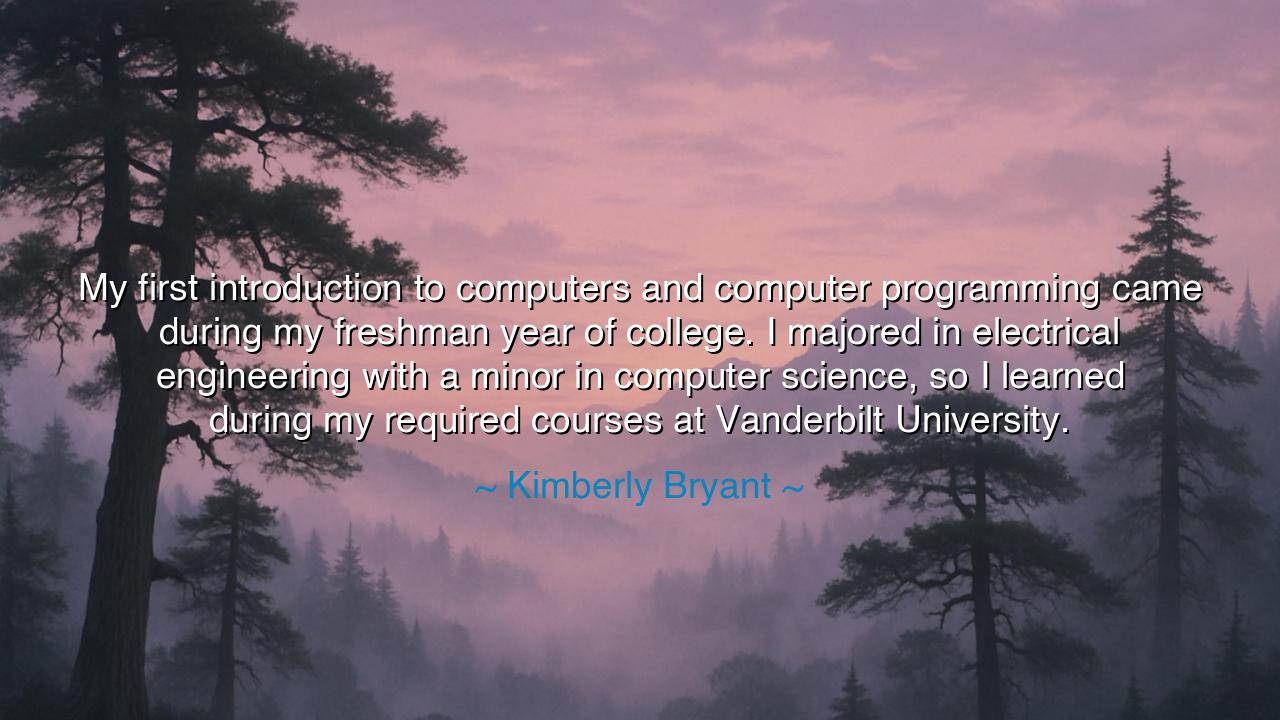
My first introduction to computers and computer programming came
My first introduction to computers and computer programming came during my freshman year of college. I majored in electrical engineering with a minor in computer science, so I learned during my required courses at Vanderbilt University.






In the words of Kimberly Bryant, “My first introduction to computers and computer programming came during my freshman year of college. I majored in electrical engineering with a minor in computer science, so I learned during my required courses at Vanderbilt University.” These words, spoken by one who has traversed the path of discovery and innovation, speak to the moment of initiation—the moment when a new world opens before the mind, and the seeds of knowledge are planted. Bryant reflects on a milestone in her own life: the beginning of a journey in the world of technology, a world that continues to shape not only her own future but the future of humanity itself.
In the ancient world, the pursuit of knowledge was often viewed as a sacred and transformative act. The Greeks, for instance, believed that education was not merely the acquisition of facts, but the formation of a virtuous and reflective soul. The great philosopher Socrates used the method of questioning, called the Socratic method, to guide his students to deeper insights, not through direct instruction but through the cultivation of independent thought. Just as Socrates introduced his students to the complexities of philosophy, so did Bryant encounter the complexity of computers and programming, a modern-day philosophy in its own right, built upon the foundations of logic and design.
Consider the story of Archimedes, one of the greatest mathematicians and engineers of the ancient world, whose discoveries in geometry, hydrostatics, and mechanics laid the groundwork for the technological advancements of the future. Archimedes, much like Bryant, found his own world of understanding expanded during his studies—an early introduction to the principles that would later revolutionize the understanding of the physical world. Just as Archimedes encountered and applied new concepts, Bryant too ventured into a realm that, at first, was foreign to her but eventually became an integral part of her intellectual journey, shaping her path in a world that increasingly values innovation and technology.
This theme of initiation into a field of study and discovery runs through many of history’s great figures. Ada Lovelace, often considered the first computer programmer, was introduced to the concept of machines and mathematics at an early age. Her education, much like Bryant’s, was marked by a deep sense of curiosity and a desire to understand the world in ways that were still emerging. Lovelace’s work laid the groundwork for what would later become the computer programming we know today. Both Bryant and Lovelace reflect the transformative power of education—the ability to open the door to new possibilities, and to shape a future based on a deep understanding of the tools and principles that govern our world.
For Bryant, her studies in electrical engineering and computer science were not simply about learning a discipline or acquiring technical skills, but about the journey of empowerment—the ability to create, innovate, and shape the future. The pursuit of knowledge in these fields is an ongoing process, one that requires both dedication and adaptability as new discoveries unfold and technology rapidly evolves. In her words, we hear the essence of growth, the excitement of engaging with a world of endless potential, where the ideas of the future are built upon the knowledge gained today.
In the same way that the great philosophers and scientists of the past shaped the intellectual landscape of their time, Bryant and others in her field are shaping the future of technology. The computer, a creation born of mathematics and logic, is now at the heart of nearly every aspect of modern life. Just as Plato used the Academy to pass on knowledge to future generations, so too does Bryant continue the tradition of education by learning and passing on knowledge that will inform and inspire future generations of innovators.
The lesson in Bryant's words is one of growth, curiosity, and the transformative power of education. Just as the ancient philosophers and scientists used their studies to forge paths toward new knowledge, so too can we, through the pursuit of knowledge, shape our own destinies and contribute to the world around us. Whether in engineering, science, or any other field, the journey of learning never truly ends. Bryant’s introduction to the world of computers marks not an end, but a beginning—a continuation of an ancient tradition of intellectual exploration and discovery.
Let her example inspire you to embrace the journey of learning, to seek out the opportunities that lie before you, and to recognize that education is a lifelong process. Whether you walk the path of technology, philosophy, or any other discipline, remember that it is through the pursuit of knowledge that you can make a difference, not only in your own life but in the lives of others. Approach your own learning with the same curiosity and dedication that Bryant embraced, and in doing so, you will contribute to the world’s ongoing story of progress and innovation.






AAdministratorAdministrator
Welcome, honored guests. Please leave a comment, we will respond soon